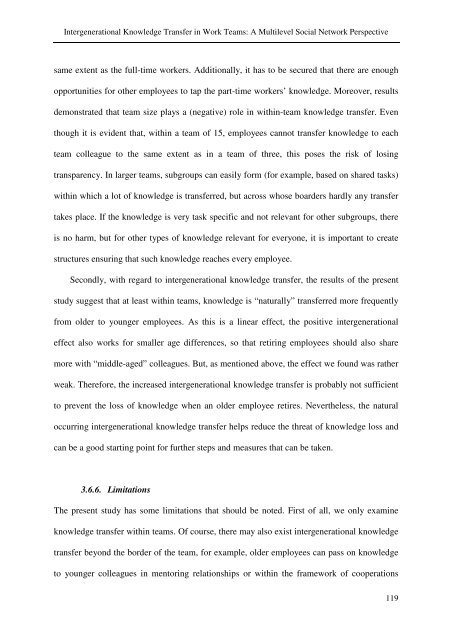thesis_Daniela Noethen_print final - Jacobs University
thesis_Daniela Noethen_print final - Jacobs University
thesis_Daniela Noethen_print final - Jacobs University
Create successful ePaper yourself
Turn your PDF publications into a flip-book with our unique Google optimized e-Paper software.
Intergenerational Knowledge Transfer in Work Teams: A Multilevel Social Network Perspective<br />
same extent as the full-time workers. Additionally, it has to be secured that there are enough<br />
opportunities for other employees to tap the part-time workers’ knowledge. Moreover, results<br />
demonstrated that team size plays a (negative) role in within-team knowledge transfer. Even<br />
though it is evident that, within a team of 15, employees cannot transfer knowledge to each<br />
team colleague to the same extent as in a team of three, this poses the risk of losing<br />
transparency. In larger teams, subgroups can easily form (for example, based on shared tasks)<br />
within which a lot of knowledge is transferred, but across whose boarders hardly any transfer<br />
takes place. If the knowledge is very task specific and not relevant for other subgroups, there<br />
is no harm, but for other types of knowledge relevant for everyone, it is important to create<br />
structures ensuring that such knowledge reaches every employee.<br />
Secondly, with regard to intergenerational knowledge transfer, the results of the present<br />
study suggest that at least within teams, knowledge is “naturally” transferred more frequently<br />
from older to younger employees. As this is a linear effect, the positive intergenerational<br />
effect also works for smaller age differences, so that retiring employees should also share<br />
more with “middle-aged” colleagues. But, as mentioned above, the effect we found was rather<br />
weak. Therefore, the increased intergenerational knowledge transfer is probably not sufficient<br />
to prevent the loss of knowledge when an older employee retires. Nevertheless, the natural<br />
occurring intergenerational knowledge transfer helps reduce the threat of knowledge loss and<br />
can be a good starting point for further steps and measures that can be taken.<br />
3.6.6. Limitations<br />
The present study has some limitations that should be noted. First of all, we only examine<br />
knowledge transfer within teams. Of course, there may also exist intergenerational knowledge<br />
transfer beyond the border of the team, for example, older employees can pass on knowledge<br />
to younger colleagues in mentoring relationships or within the framework of cooperations<br />
119

















